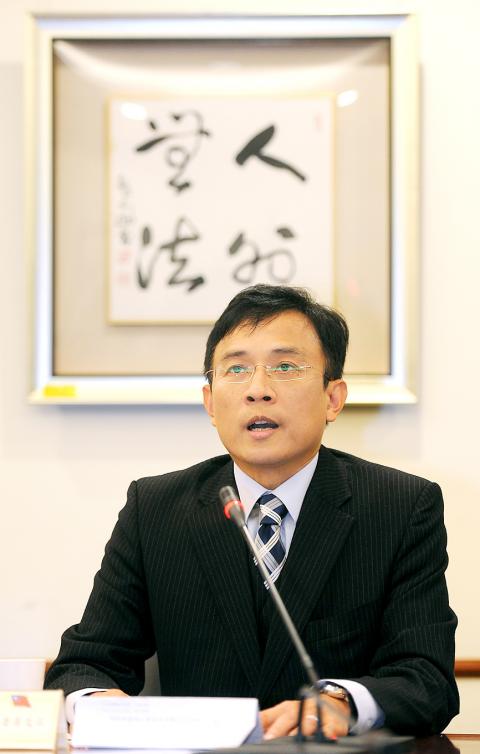Minister of Justice Lo Ying-shay (羅瑩雪) yesterday confirmed media reports that Prosecutor Evaluation Committee member Peng Wen-cheng (彭文正) is not included in the list of committee members who are to start their second terms next month.
The reports have sparked speculation that the exclusion was a move by the ministry to settle a score with Peng for his role in leading the 11-member committee to recommend that Prosecutor-General Huang Shih-ming (黃世銘) be dismissed after a two-month investigation.
Huang is alleged to have leaked investigative findings to President Ma Ying-jeou (馬英九) that were gleaned from wiretapped conversations and accused Legislative Speaker Wang Jin-pyng (王金平) of lobbying the judiciary against appealing a breach of trust case against Democratic Progressive Party caucus whip Ker Chien-ming (柯建銘).

Photo: Liu Hsin-de, Taipei Times
Asked about Peng’s exclusion, Lo said: “The nominating panel did not recommend his name this time. The justice ministry was not involved in the process. We can only choose the names from the submitted list.”
She denied that it had anything to do with political retribution.
However, many officials and legislators viewed the move as political meddling by the government and the ministry to remove opposition in the committee.
Ministry officials echoed Lo’s statement yesterday, saying that the list for second-term committee members had been reviewed and approved by the minister on Dec. 2, and that the extension of the members’ tenure has nothing to do with the result of the investigation nor the recommendations made by the committee against Huang on Saturday.
In response, Peng told reporters: “Judicial reform still has a long way to go in Taiwan. My tenure was not renewed for a second term and political retribution most likely played a role. Now I can go back to school and continue teaching.”
Convened in January last year, the Prosecutor Evaluation Committee has a two-year tenure, with members eligible to continue for a second term.
The panel is staffed by seven members selected from judges, prosecutors and law practitioners, along with four members representing public interests composed of experts and academics, such as Peng, a professor from National Taiwan University’s Graduate Institute of Journalism. Peng acted as committee spokesperson in the investigation into Huang.

SECURITY: As China is ‘reshaping’ Hong Kong’s population, Taiwan must raise the eligibility threshold for applications from Hong Kongers, Chiu Chui-cheng said When Hong Kong and Macau citizens apply for residency in Taiwan, it would be under a new category that includes a “national security observation period,” Mainland Affairs Council (MAC) Minister Chiu Chui-cheng (邱垂正) said yesterday. President William Lai (賴清德) on March 13 announced 17 strategies to counter China’s aggression toward Taiwan, including incorporating national security considerations into the review process for residency applications from Hong Kong and Macau citizens. The situation in Hong Kong is constantly changing, Chiu said to media yesterday on the sidelines of the Taipei Technology Run hosted by the Taipei Neihu Technology Park Development Association. With

CARROT AND STICK: While unrelenting in its military threats, China attracted nearly 40,000 Taiwanese to over 400 business events last year Nearly 40,000 Taiwanese last year joined industry events in China, such as conferences and trade fairs, supported by the Chinese government, a study showed yesterday, as Beijing ramps up a charm offensive toward Taipei alongside military pressure. China has long taken a carrot-and-stick approach to Taiwan, threatening it with the prospect of military action while reaching out to those it believes are amenable to Beijing’s point of view. Taiwanese security officials are wary of what they see as Beijing’s influence campaigns to sway public opinion after Taipei and Beijing gradually resumed travel links halted by the COVID-19 pandemic, but the scale of

A US Marine Corps regiment equipped with Naval Strike Missiles (NSM) is set to participate in the upcoming Balikatan 25 exercise in the Luzon Strait, marking the system’s first-ever deployment in the Philippines. US and Philippine officials have separately confirmed that the Navy Marine Expeditionary Ship Interdiction System (NMESIS) — the mobile launch platform for the Naval Strike Missile — would take part in the joint exercise. The missiles are being deployed to “a strategic first island chain chokepoint” in the waters between Taiwan proper and the Philippines, US-based Naval News reported. “The Luzon Strait and Bashi Channel represent a critical access

Pope Francis is be laid to rest on Saturday after lying in state for three days in St Peter’s Basilica, where the faithful are expected to flock to pay their respects to history’s first Latin American pontiff. The cardinals met yesterday in the Vatican’s synod hall to chart the next steps before a conclave begins to choose Francis’ successor, as condolences poured in from around the world. According to current norms, the conclave must begin between May 5 and 10. The cardinals set the funeral for Saturday at 10am in St Peter’s Square, to be celebrated by the dean of the College